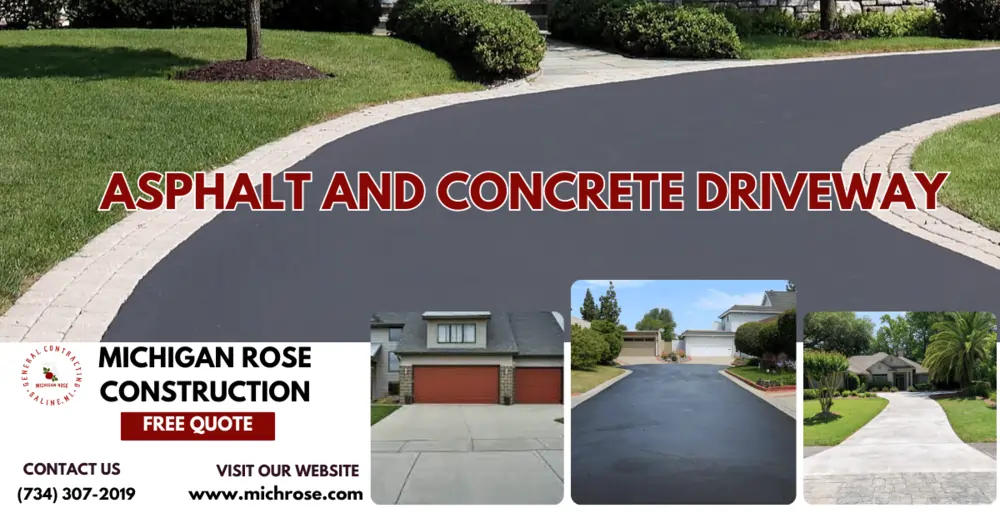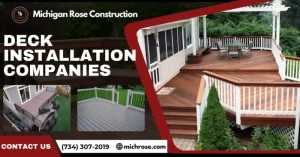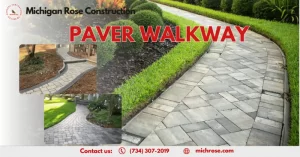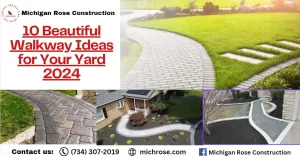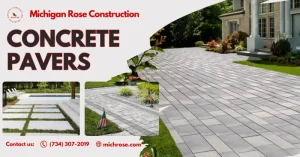Asphalt and Concrete Driveway: Introduction
Asphalt and concrete driveway are the two most popular surfacing materials. They each have their own strengths and weaknesses that make them suitable for different needs and budgets. In general, asphalt driveways are less expensive to install while concrete is the more durable, low-maintenance option with a refined appearance. When deciding between asphalt vs. concrete, homeowners weigh factors like cost, climate, look and feel.
This guide provides an in-depth overview of asphalt and concrete driveways to help you determine which is better suited for your home. We’ll compare the asphalt and concrete driveway pros and cons of each material across important considerations like upfront cost, lifespan, appearance, maintenance, traction and more. With the right information, you can make an informed decision on paving material that checks all the boxes for your driveway goals and needs.
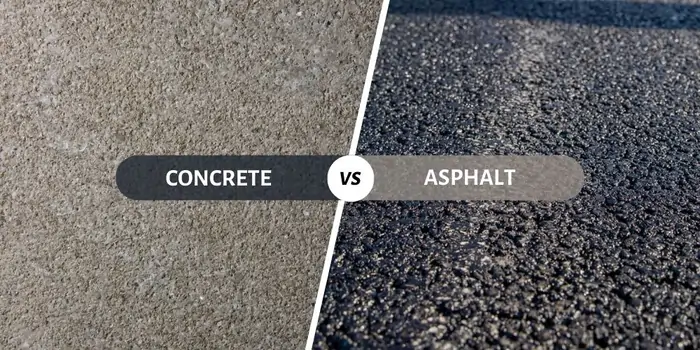
Asphalt and Concrete Driveway Cost
When it comes to initial cost, asphalt is often the more affordable option for driveway material. An asphalt driveway will generally cost $2-5 per square foot installed. The cost can vary depending on your location, the size and complexity of the driveway, and whether you use a single or double layer of asphalt.
A basic concrete driveway often runs $5-10 per square foot installed. Concrete is more expensive for a few reasons:
- The materials alone tend to cost more than asphalt materials. Concrete requires cement, sand, gravel and steel reinforcing wire mesh. Asphalt uses stone aggregates mixed with bitumen.
- Concrete takes more labor and time to install. It needs to be poured and smoothed. Forms usually need to be constructed and removed. Finishing and curing time takes longer.
- Concrete is less forgiving than asphalt if the base is not properly prepared. Any mistakes in base preparation show up in the final product.
The bottom line is that asphalt will generally be the cheaper upfront option for most homeowners. However, cost differences do become less significant for larger driveways where economy of scale comes into play for concrete. Maintenance and lifespan costs also factor in when weighing asphalt versus concrete over the long run. We’ll explore those differences next.
Asphalt and Concrete Driveway Durability
When it comes to how long an asphalt or concrete driveway will last, there are a few factors to consider.
Asphalt driveways generally have a lifespan of 15-20 years on average. However, this can vary quite a bit depending on climate, traffic volume, and maintenance. Asphalt is more flexible than concrete and can better withstand minor ground movement. However, it is more prone to damage from gasoline, oil spills, and heavy loads over time. The asphalt binder that holds the aggregate together also oxidizes over time, causing the material to become more brittle. This can lead to cracking, raveling of the surface, and potholes. With proper maintenance like crack sealing and surface treatments, asphalt can often last 20+ years. Extreme hot or cold climates may shorten its lifespan.
Concrete driveways are extremely durable, often lasting 30 years or more. High-quality concrete with proper subgrade preparation and control joints can remain smooth and crack-free for decades. It is not impacted by gas or oil spills. Concrete’s rigid nature makes it more prone to cracking due to ground settling or tree root growth, but this is usually manageable with control joints. Minor cracks in concrete can be filled to prevent further deterioration. In northern climates subject to freeze-thaw cycles, air entrained concrete should be used to improve durability. With periodic maintenance like joint resealing, concrete drives can last 40+ years.
So in summary, concrete generally has a longer lifespan, but both materials can last 20+ years if properly installed and maintained. Concrete may cost more upfront but require less frequent repairs and replacements over its lifetime. Asphalt tends to be more budget-friendly initially but needs more ongoing maintenance.
Asphalt and Concrete Driveway Maintenance

When it comes to driveway maintenance, asphalt and concrete have different requirements. With asphalt driveways, owners should plan to sealcoat every 2-3 years on average. This protects the asphalt from exposure to oils, gas, salt, and UV rays. Without regular sealing, asphalt can become brittle and begin to deteriorate. Cracks should also be filled as they occur to prevent further damage.
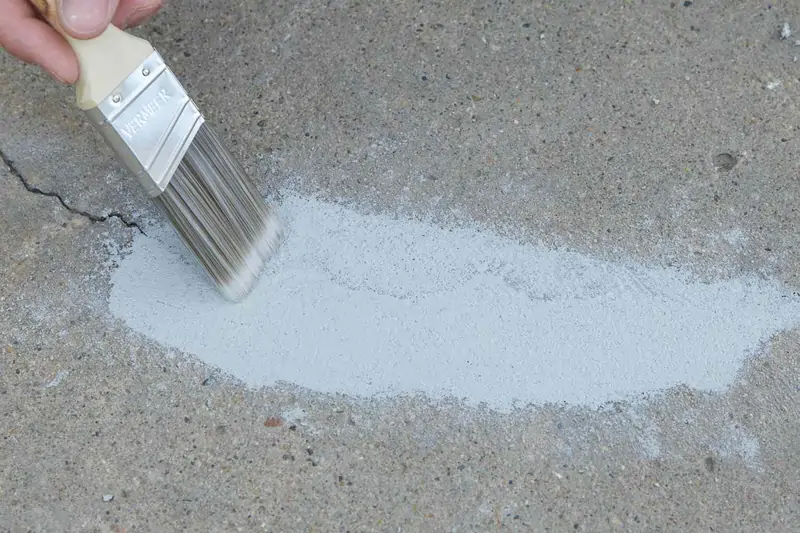
Concrete driveways are more durable than asphalt and do not require sealcoating. However, concrete is still susceptible to cracking over time. These cracks should be sealed as soon as they appear to prevent long-term damage. Weeds can also grow in the cracks of concrete, so regular removal is important. Compared to asphalt, concrete is less prone to damage from gas, oil, and salt. But both concrete and asphalt can be stained from vehicle fluids and will require cleaning.
When maintained properly, both asphalt and concrete can last for decades. Asphalt requires more frequent maintenance and resealing, while concrete needs less frequent repairs for cracks and stains. Proper maintenance is key for getting the longest life from either material.
Asphalt and Concrete Driveway Appearance
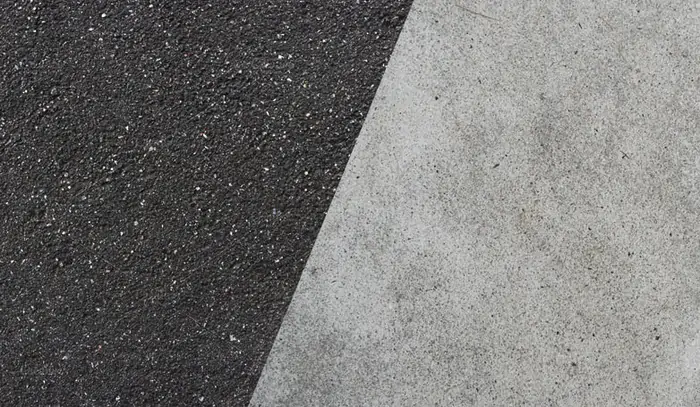
When it comes to visual appeal, asphalt and concrete driveways in Canton MI have distinct differences.
Asphalt driveways are typically black or dark grey. The asphalt material is mixed and poured while hot, then compacted into a smooth surface as it cools. The color can lighten over time with exposure to the sun. Asphalt is a very flexible material that can be impressed with interesting patterns or designs while it is still warm during installation.
Concrete driveways are generally light grey or a tan/beige color. The appearance results from the cement, sand and stone aggregate mixture that is poured and cured. Concrete can also be stamped with patterns or stenciled with color hardeners while wet to create a range of looks. But plain concrete has a rather monotone, industrial look on its own.
For those wanting bold colors or intricate designs, stamped or stained concrete is the best option. Asphalt and plain concrete have a more basic, utilitarian appearance in terms of visual appeal. Keep in mind that both asphalt and concrete driveways can be customized to achieve different aesthetics.
Asphalt and Concrete Driveway Traction
When it comes to traction, asphalt and concrete driveways perform quite differently, especially when weather conditions are less than ideal.
Asphalt provides significantly better traction than concrete when the surface is wet. This is because asphalt is much more porous than concrete, allowing water to drain through more quickly. Concrete becomes very slick when wet because water sits on top of the surface.
Asphalt also maintains better traction in snowy conditions. The rough texture of asphalt allows tires to grip the surface better compared to smooth concrete. As snow compacts on a concrete driveway, it can become extremely slippery with a sheet of ice forming on top. The porous nature of asphalt helps snow melt faster so ice has less chance to build up.
Traction should be a key consideration for those in climates with frequent rain or snow. An asphalt driveway will provide better safety and prevent slipping and sliding, especially for exiting vehicles. Concrete looks nice when dry, but turns treacherous when wet. Going with asphalt is the smarter choice if dealing with moisture is a regular concern in your area.
Asphalt and Concrete Driveway Noise
Asphalt and concrete driveways can differ significantly when it comes to noise levels. The sound of cars driving over the two surfaces is noticeably different.
Asphalt driveways tend to be louder than concrete for a few reasons. The aggregate materials that make up asphalt don’t fit together as tightly as concrete, leaving more space for air pockets. When driven over, the tires press down on these pockets, compressing the air and creating a loud slap or popping sound. The more textured and irregular surface of asphalt also generates more tire noise as the tread interacts with the small gaps and indentations.
Concrete driveways on the other hand provide a tighter, denser, and smoother surface for tires to roll over quietly. The continuous surface doesn’t have pockets of air that get compressed by the weight of a vehicle. This results in a hushed driving experience over concrete compared to asphalt. Homeowners that prefer less noise from cars pulling in and out of the driveway often favor concrete for this reason.
The difference in loudness is quite noticeable, especially for homes where the driveway is close to living spaces. Over time, the recurring noise of vehicles on an asphalt driveway near bedrooms or patios can become annoying. For most homeowners, concrete provides a welcome reduction in noise and interruption. When evaluating paving materials, sound levels are an important factor to consider. The noise of a vehicle pulling into the driveway varies substantially between asphalt and concrete surfaces.
Asphalt and Concrete Driveway Resale Value
A home’s curb appeal plays an important role in attracting potential buyers and securing the highest sales price. When improving or replacing your driveway, it’s wise to consider the impact on your home’s resale value.
Asphalt and concrete each have their pros and cons when it comes to boosting your home’s appeal to buyers. An asphalt driveway may detract from a home’s value and make it seem less prestigious. Some buyers perceive asphalt to be a lower quality material compared to concrete. However, a well-maintained asphalt driveway with a fresh topcoat can still look quite attractive.
Concrete is generally viewed as a higher end material and more aesthetically pleasing. The uniform appearance of concrete can better complement landscaping and home exteriors. Realtors often recommend concrete over asphalt for boosting a home’s resale potential. However, concrete is not necessarily required to increase value.
More important than the driveway material itself is the overall condition. Any driveway that is damaged, broken or severely cracked will turn off buyers. Proper sealing, repairs and maintenance are key. As long as your driveway looks well-kept, whether asphalt, concrete or another material, it can still positively impact resale value.
Asphalt and Concrete Driveway Environmental Impact
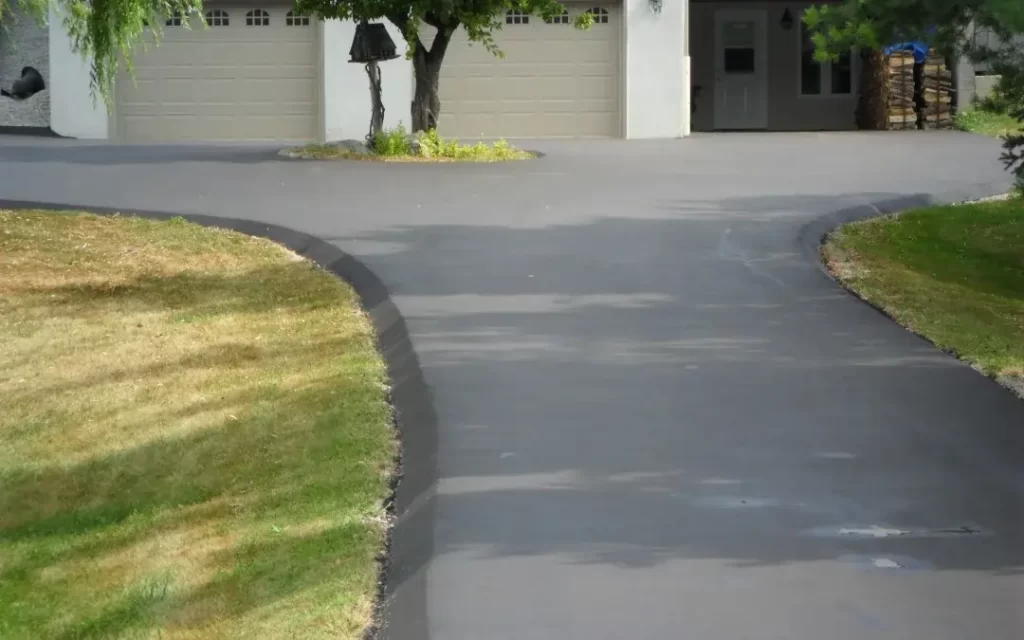
When choosing between an asphalt or concrete driveway, it’s important to consider the manufacturing process and lifecycle environmental impact of each material.
Asphalt is produced by heating and refining petroleum into bitumen, then combining it with aggregate rock. The energy and emissions from petroleum refining and transport are significant. Over its lifespan, an asphalt driveway will require periodic re-paving, adding more environmental impact each time. The old asphalt also cannot be easily recycled, often ending up in landfills.
In contrast, concrete is made by combining sand, gravel, water and cement. The cement production process does generate CO2 emissions from heating limestone and other materials. However, concrete driveways are extremely long-lasting, with minimal maintenance needed over decades of use. At end of life, concrete can also be crushed and recycled into aggregate for new projects.
Overall, concrete has a lower lifetime environmental impact compared to asphalt driveways of equivalent size and use. With continuous paving, an asphalt driveway may need replacement every 10-15 years, whereas a well-built concrete driveway can last 50 years or longer. This means far fewer resources and emissions over time with concrete.
When planning a new driveway, be sure to consider these manufacturing and lifetime environmental factors alongside appearance, cost and performance. Opting for concrete is often the more sustainable choice.
Check Concrete and Asphalt Services.
Conclusion
Overall asphalt and concrete driveways have trade-offs. Asphalt is generally cheaper but needs more maintenance. Concrete is more durable but more expensive.
Asphalt comes in more color and finishes but concrete offers a classic look that more home buyers prefer. Asphalt provides better traction but concrete is less noisy.
The environmental impact depends on your climate and conditions. In warmer areas asphalt is better since it requires less energy to produce, but in colder areas the production of concrete may be preferred.
The best option comes down to your budget, climate, and personal preferences around appearance, maintenance and noise. If cost is your main concern, asphalt is the better choice. If you prefer a classic, low maintenance look and don’t mind paying more upfront, concrete is recommended.
Let us help you plan your driveway now!
Visit Michigan Rose Construction Facebook Page or you can call (734) 307-2019

